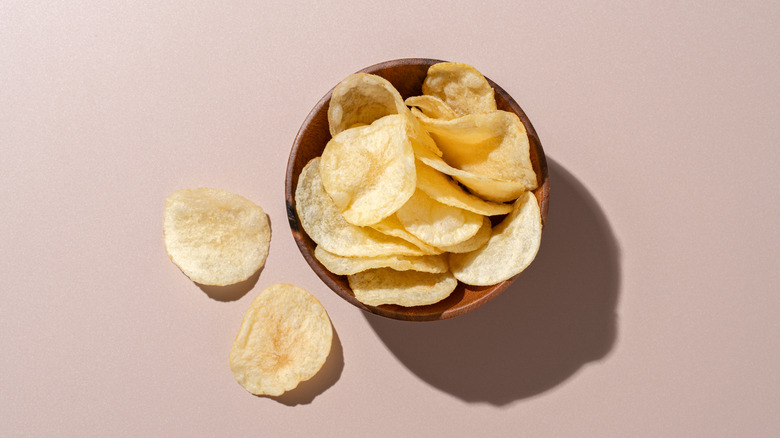The Lay's Snacks That Were Discontinued For An Uncomfortable Reason
Ah, potato chips. So crispy, salty, and craveable, yet so often a bit (or a lot) expansive on the waistline. Even so, we love some chips in moderation. Trader Joe's Patio Potato Chips, for instance, were discontinued due to a fire at a factory, but we still remember eating a whole bunch. In 1998, Frito-Lay figured that it had caught lightning in a bottle: a chip that was fried in a new calorie-free oil called Olestra. The resulting product, dubbed Lay's WOW chips, tasted just like your run-of-the-mill snack. Yet, it was fat-free because Olestra ran through the digestive tract too quickly to be absorbed by the body.
If that sounds too good to be true, it's because it was. Lay's WOW chips quickly became a media sensation, but for all the wrong reasons. Olestra, it was quickly discovered, led to intestinal upset in a lot of consumers. In the best cases, this translated to a rumbling tummy and some mild discomfort. In the worst cases, you were dealing with uncontrollable diarrhea and oily leakage from, uh, the end of the line.
How did a 1990s snack food you forgot ever existed go from a revolutionary idea to one of TIME magazine's 50 Worst Inventions of all time? The story is kind of wild and probably would have broken the internet if more people were behind a keyboard in the late 1990s and ready to dive into the unfortunate effects of '90s diet culture.
Gross side effects spelled the end for WOW chips
The year that WOW chips were released, they skyrocketed to $347 million in sales and swiftly became the bestselling new product in America. The 1990s were a time in which dieters were bombarded with messages regarding the evils of dietary fat, and many subsequently tried to cut it out at any opportunity. Thus, SnackWells cookies and fro-yo were other faddy foods of the non-fatty era. Lay's WOW chips definitely filled a niche in the market, which was wild for what were deemed guilt-free snacks that could be enjoyed like their regular counterparts. Unfortunately, rumbly guts and a pronounced laxative effect were more than even the most dedicated dieters were willing to put up with.
The FDA approved Olestra as a food additive in 1996 and, shockingly, it remains legal in America (though it's banned in the European Union and Canada). By 2000, however, the once-robust sales of WOW chips had plummeted to $200 million. The chips had become a national joke, with potty humor and shocking anecdotes about pants being ruined bandied about on talk shows and in magazines. Frito-Lays rebranded WOW chips to a "Light" label in 2004, trying to shed the stink of notoriety, but still kept Olestra in the formulation. It wasn't until 2016 that the chip company admitted defeat and axed Olestra from its line entirely, consigning WOW chips to the annals of history and the list of snack food products that were discontinued for good reason.

